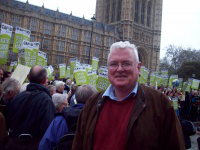Foodbanks – A National Crisis

Fr Peter Hughes SSC
Columban Father Peter Hughes suggests that Foodbanks may be a short term necessity, but cannot be the long-term solution.
Every year around this time UN World Food Day reminds us to pay attention to the multitude of people who suffer from not having enough to eat. The hunger statistics are overwhelming. According to the World Food Programme 870 million people are hungry – that’s greater than the combined populations of the United States, Canada and the European Union. Every day approximately 16,000 children die because they are too poor to live. When we read these kinds of statistics we normally think of far distant countries in Africa or Asia. However, we can look much nearer home to find a severe problem of hunger in our own country.
This is manifesting itself in the alarming rise of food banks which have sprung up around the country. From Dunstable to Devon, Newcastle to North London, the National Justice and Peace Network (NJPN) members and others are increasingly involved in setting up and running foodbanks as more people in the UK are turning to church-run foodbanks to cope with the rising cost of living. The Christian charity, the Trussell Trust, reports that 100,000 people have received emergency food from its network of foodbanks in the last six months. New foodbanks are being opened at a rate of three a week to meet the demand. The network has fed almost 110,000 people across the UK since April 2012 and is expecting to feed over 200,000 people by the end of the 2012 to 2013 period, compared with 128,697 during the whole of last year. These figures do not include the many other groups in the UK who are also involved in foodbanks. The increase in demand is being put down to rising food and fuel costs, together with static incomes, high unemployment and changes to benefits. Trussell Trust executive chairman Chris Mould said: "Day in, day out, food banks already meet UK parents who are going without food to feed their children, or are forced to consider stealing to stop their children going to bed hungry.
A breakdown of the figures also shows that while less than one percent of those being referred are pensioners, there appeared to be a prevalence of young teenagers and adults taking up emergency food aid. In the latest set of figures, 14,500 people, 16% of all those being referred, were aged 16-24, a group that makes up around 11% of the UK population in total. Chris Mould, said that while they weren't reaching as many old people as they should be, travel and rent increases and the dire state of the youth employment market had left many of the UK's young adults in a desperate state with little financial resilience. Manchester Labour MP, and former head of the Child Poverty Action Group, Kate Green describes the growth of food banks as a disgrace. "I feel a real burning anger about them," she says. "People are very distressed at having to ask for food; it's humiliating and distressing."
The boom in Britain's food banks reflects a number of worrying trends. As well as rising unemployment, more people are seeing their hours cut at work. For the past couple of years, charities have been warning that a shift to a less generous way of updating benefits in line with inflation, combined with rising food and fuel prices, would make life more difficult for people claiming benefits. Then there is the start of a new, harsher benefits regime, as a result of which more claimants are having their payments sanctioned – cut or stopped entirely – if they miss appointments. At the same time, the state system of a social fund and crisis loans is being wound down, so emergency cash payments from the welfare system for those deemed to be in extreme need are now exceptionally difficult to procure. Around 43% of visitors to Trussell Trust distribution centres nationwide come because of changes to their benefits or a crisis loan being refused. With food prices predicted to rise further and incomes of the poorest stagnant or falling the future is bleak. And all this in a still wealthy country, with supermarket shelves heaving with food!
This is indeed a sad reflection on a rich country like the UK which should be capable of at the very least feeding the poorest and most vulnerable of its citizens. Surely no government should depend on charity as a means of feeding it’s poor and needy? This poses serious questions for us as Christians. We believe in Jesus who was sent “to bring the Good News to the poor.”(Lk.4, 18). In 1979 Blessed Pope John Paul II said in a New York City homily: "The poor of the United States and of the world are your brothers and sisters in Christ. Never be content to leave them just the crumbs of the feast. Take of your substance, and not just of your abundance, in order to help them. Treat them like guests at your family table!"
There needs to be a concerted effort to regain a social justice footing as a basis to tackling hunger. Of course, NJPN partners such as Church Action on Poverty (CAP) and Housing Justice are well aware of the complexity of problems. Speaking recently on BBC Radio Wales, Niall Cooper, Director of CAP highlighted that at least 90,000 children in Wales are in families which can’t afford both adequate food and heating their homes. In the context of growing inequality and hardship, foodbanks fill a gap that is widening week by week and church involvement is inspiring. Yet, Niall pointed out that the number of people being helped, when compared to the need, “is deeply worrying”. He added that the “deeper safety net that society provides is increasingly frayed”. As we meet the immediate need, let’s also campaign against the injustices that have caused the need. Social action must be coupled with social justice. Let’s make our voice heard by the Government ministers who want to cut a further £10 billion from the payments made to the most vulnerable and needy.
Foodbanks may be a short term necessity, but cannot be the long-term solution. If a UK food crisis is to be averted, concerted action is needed to boost the incomes of the poorest and to hold down the escalating cost of food and other essential goods. But what chance of this in an age of austerity?
Fr Peter Hughes SSC heads the Columban programme for Justice, Peace and the Integrity of Creation and sits on the Executive of the National Justice and Peace Network.
For more information see: www.columbans.co.uk and www.justice-and-peace.org.uk


















